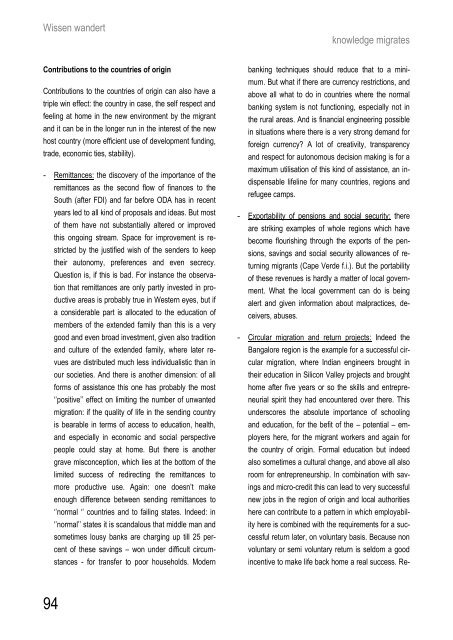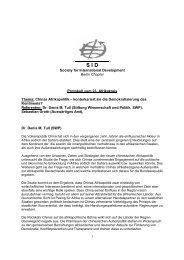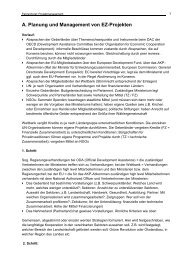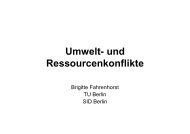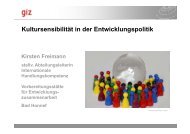Konferenzbericht (PDF-Dokument, 3 MB) - SID
Konferenzbericht (PDF-Dokument, 3 MB) - SID
Konferenzbericht (PDF-Dokument, 3 MB) - SID
Erfolgreiche ePaper selbst erstellen
Machen Sie aus Ihren PDF Publikationen ein blätterbares Flipbook mit unserer einzigartigen Google optimierten e-Paper Software.
Wissen wandert<br />
Contributions to the countries of origin<br />
Contributions to the countries of origin can also have a<br />
triple win effect: the country in case, the self respect and<br />
feeling at home in the new environment by the migrant<br />
and it can be in the longer run in the interest of the new<br />
host country (more efficient use of development funding,<br />
trade, economic ties, stability).<br />
- Remittances: the discovery of the importance of the<br />
94<br />
remittances as the second flow of finances to the<br />
South (after FDI) and far before ODA has in recent<br />
years led to all kind of proposals and ideas. But most<br />
of them have not substantially altered or improved<br />
this ongoing stream. Space for improvement is re-<br />
stricted by the justified wish of the senders to keep<br />
their autonomy, preferences and even secrecy.<br />
Question is, if this is bad. For instance the observa-<br />
tion that remittances are only partly invested in pro-<br />
ductive areas is probably true in Western eyes, but if<br />
a considerable part is allocated to the education of<br />
members of the extended family than this is a very<br />
good and even broad investment, given also tradition<br />
and culture of the extended family, where later re-<br />
vues are distributed much less individualistic than in<br />
our societies. And there is another dimension: of all<br />
forms of assistance this one has probably the most<br />
„‟positive‟‟ effect on limiting the number of unwanted<br />
migration: if the quality of life in the sending country<br />
is bearable in terms of access to education, health,<br />
and especially in economic and social perspective<br />
people could stay at home. But there is another<br />
grave misconception, which lies at the bottom of the<br />
limited success of redirecting the remittances to<br />
more productive use. Again: one doesn‟t make<br />
enough difference between sending remittances to<br />
„‟normal „‟ countries and to failing states. Indeed: in<br />
„‟normal‟‟ states it is scandalous that middle man and<br />
sometimes lousy banks are charging up till 25 per-<br />
cent of these savings – won under difficult circum-<br />
stances - for transfer to poor households. Modern<br />
knowledge migrates<br />
banking techniques should reduce that to a mini-<br />
mum. But what if there are currency restrictions, and<br />
above all what to do in countries where the normal<br />
banking system is not functioning, especially not in<br />
the rural areas. And is financial engineering possible<br />
in situations where there is a very strong demand for<br />
foreign currency? A lot of creativity, transparency<br />
and respect for autonomous decision making is for a<br />
maximum utilisation of this kind of assistance, an in-<br />
dispensable lifeline for many countries, regions and<br />
refugee camps.<br />
- Exportability of pensions and social security: there<br />
are striking examples of whole regions which have<br />
become flourishing through the exports of the pen-<br />
sions, savings and social security allowances of re-<br />
turning migrants (Cape Verde f.i.). But the portability<br />
of these revenues is hardly a matter of local govern-<br />
ment. What the local government can do is being<br />
alert and given information about malpractices, de-<br />
ceivers, abuses.<br />
- Circular migration and return projects: Indeed the<br />
Bangalore region is the example for a successful cir-<br />
cular migration, where Indian engineers brought in<br />
their education in Silicon Valley projects and brought<br />
home after five years or so the skills and entrepre-<br />
neurial spirit they had encountered over there. This<br />
underscores the absolute importance of schooling<br />
and education, for the befit of the – potential – em-<br />
ployers here, for the migrant workers and again for<br />
the country of origin. Formal education but indeed<br />
also sometimes a cultural change, and above all also<br />
room for entrepreneurship. In combination with sav-<br />
ings and micro-credit this can lead to very successful<br />
new jobs in the region of origin and local authorities<br />
here can contribute to a pattern in which employabil-<br />
ity here is combined with the requirements for a suc-<br />
cessful return later, on voluntary basis. Because non<br />
voluntary or semi voluntary return is seldom a good<br />
incentive to make life back home a real success. Re-


